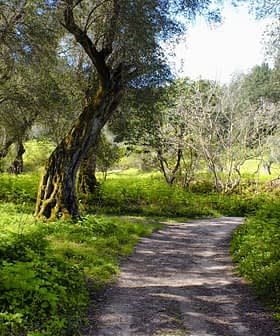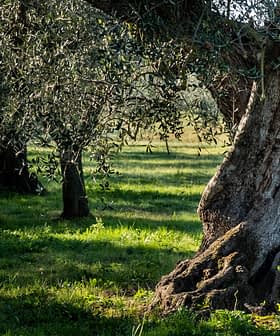The Rise of Organic Olive Oil in Greece
Small-scale Greek producers are taking a gamble that the risk of investing in organic olive oil production will pay off. Some say Greece has the ideal conditions in which to do so.
For Greek consumers, organic olive oil and olives are a high-end product. To compensate for higher production costs, producers charge a higher price, which makes demand for organic olives and olive oil weak.
With a large variety of quality olive oils available at very affordable prices, competition for the organic versions of the country’s favorite staples will always be healthy.
Selling large quantities of olive oil in bulk, 17-liter tins, also does not help the organic olive oil market to reach its full potential, in spite of the high-quality advantage.
In order to be certain and absolutely trustworthy in what we provide, we carry out much more stringent controls than the law requires.
Things are quite different for healthy eaters abroad though. With the exception of Italy and Spain, where the olive culture is deeply rooted, olive oil and olives are generally not geared to mass consumption. They are bought and enjoyed in small quantities and packaged in small packaging.
Those willing to pay the price difference are generally consumers who are conscious of the health benefits of the Mediterranean diet, which is gaining ground worldwide. For the healthy eaters the price difference of organic olive oil and olives is relatively small, as they are in any case consumed in very small quantities as a natural ‘medicine’ and also offer a unique culinary experience.
See Also:Organic Olive OilOn a global scale, the organic food market has been thriving and is no longer a niche market. Sales of organic foods in the European Union grew by 47 percent between 2012 and 2016. Its value now stands at €30 billion ($34.3 billion). The U.S. and Canadian markets for organic foods represent a total value of about €42 billion ($48 billion), while that of China stands at over €5 billion ($5.72 billion).
At the same time, the area of organic farmland in the EU rose by 18.7 percent between 2012 and 2016, rising from 24.7 million to 29.4 million acres.
Realizing it has strong potential, Greek olive farmers have been switching to organic olive farming. Greece’s organic olive-growing output has grown from 22,000 tons to 132,000 tons in five years, accounting for an average of 8.7 percent of the country’s total olives production in the period from 2013 to 2017.
Moreover, experts estimate that there is potential for growth in sales of the domestic market, given that the current turnover is at a very low level, which leaves room for further development.
To unlock the potential of organic olive oil and olives, farmers of course need to be prepared to put in extra work, make a serious financial investment upfront as well as be patient. The fact that olive farming is relatively straightforward is not enough to ensure success or survival of the olive producer in a fast-paced international market.
Organic suits Greece
Greece has key advantages in the production of organic olives. The olive tree is perfectly adjusted to the Greek environment and holds few surprises for the producer.
Thanks to the right climate and soil conditions, the olive tree bears yields even in poor years and given proper care, harvests are abundant. At the same time the model of organic production is in line with the fractured small-scale production typical in Greece.
The family-run small businesses that form the backbone of Greek olive production are in a better position to meet the needs of the organic rather than conventional olive oil, which requires a much larger scale of operation.
Organic olive oil farmers can also explore and capture the advantages offered by a great variety of terroirs, which bring character and identity that makes a product unique and able to claim a higher price on the shelf.
New entrants turn to exports
There is a condition to success for new entrants into the businesses of organic olive oil. In order to secure a foothold, small enterprises need to gear their sales to the export markets even more so than traders of conventional olive oil.
The reason is that the recession has hit the retail sector of organic products hard. Specialized stores dealing in bio-foods have downsized their operations, often choosing to cut out the pricier brands from their range of products.
Terms of payment have also taken a slide with delays in the payment of producers. At the same time, the risk of closure is also significant, which makes the business environment even more insecure.
On the contrary, according to Giorgos Tzianoudakis, managing director of Cretanthos, a company that produces and markets organic and conventional olive oil, “export sales are more sustainable, payments are regular and orders can be planned six months ahead, which gives SMEs some breathing space.”
Strict chemical trials can be the cause of, rise or fall for an organic olive oil business.
“In order to be certain and absolutely trustworthy in what we provide, we carry out much more stringent controls than the law requires,” Tzianoudakis said. “For example, while the legal threshold for the duration of chemical tests is currently at 12 months, we choose to analyze samples of the same lot every six months to make sure that our extra virgin organic olive oil is always within the limits of chemical thresholds.”
For a small business the challenge of diving into a large and dynamically evolving market, such as the market of organic olive oil, can be daunting and requires a careful strategy.
“We started out as a company that dealt exclusively in organic olive oil, but in the process our customer asked us for additional products which would come in bigger containers and have a lower price,” Tzianoudakis said. “To meet our customer’s needs we added conventional olive oil to our products range. However, we estimate that the demand for small packaging of organic oil in bottles of 100, 200 and 500 milliliters will increase in the future and that’s why we choose to organically cultivate all our land.”
“Today only a part of our farms is certified as organic,” he added. “When the time comes, we will be ready to certify most of our production as organic and increase the volume of our export sales of biological extra virgin olive oil.”








